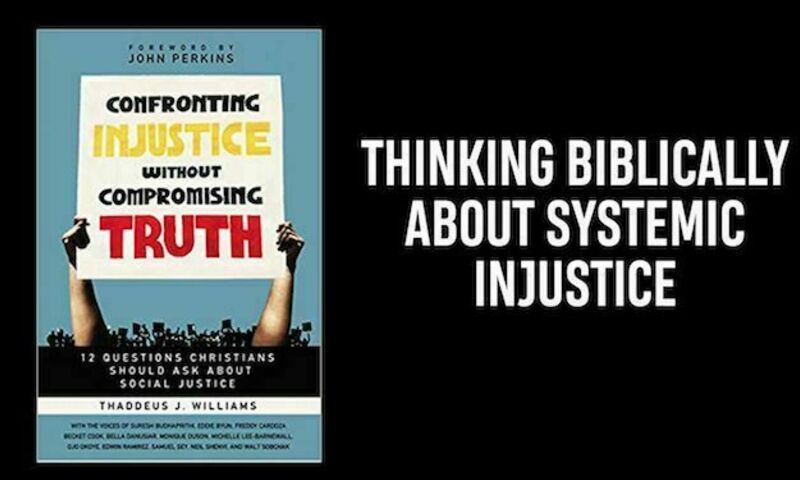[The following is adapted from Thaddeus Williams‚Äô Confronting Injustice without Compromising Truth: 12 Questions Christians Should Ask ∫⁄¡œ¿˙ ∑ Social Justice (Zondervan 2020), foreword by John Perkins. It can be ordered .]
Putting the words “systemic” and “injustice” together is a lot like putting the words social and justice together — there are biblical and unbiblical meanings we can pour into those word combinations.
The Bible nowhere uses the word “systemic.” But we would have to take scissors and do some serious Jeffersonian slicing and dicing to the inspired text to believe sin cannot be expressed systemically. The Jews’ captivity in Egypt wasn’t just Pharaoh and some slave-whipping Egyptian underlings treating God’s people as subhumans. Nations that worshiped Molech, the god of fire, had laws that permitted child sacrifice, much like abortion laws in today’s world, which formed unjust systems. The Bible’s commands aren’t merely for personal piety, but guide us to display God’s justice more radiantly in the systems of earth as it is in heaven.
Two Kinds of “Systemic Injustice”
If we infuse the terms “systemic” and “injustice” with biblical meaning, then systemic injustice is any system that either requires or encourages those within the system to break the moral laws God revealed for his creatures’ flourishing. That is the implicit biblical definition that empowered Frederick Douglass and Sojourner Truth to subvert the systems of American slavery. But that is not the way many of today’s trending visions of social justice define “systemic injustice.” If we can’t tell the difference, then we may think we are doing justice for God and the oppressed, when we are really doing the bidding of political ideologues.
If we go with today’s trending definition, then unequal outcomes become damning evidence that sexism, racism, or some other evil “ism” is at the foundation of a system. The Bible is clear that discrimination exists and that Christians must resist it (Acts 6:1-7; Gal. 3:27-28; Jam. 2:1-13). Sinful discrimination can indeed cause many disparities, such as slavery, Jim Crow segregation, redlining and Planned Parenthood’s targeting of minority communities have shown. But the Bible never goes to the extreme that we find in the thinking of Ibram X. Kendi. In his bestseller Stamped from the Beginning, Kendi argues that “racial disparities must be the result of racial discrimination.”[1] Automatically equating disparity with discrimination has gone mainstream as the way most conversations about social justice are framed in the twenty-first century. That includes conversations in the church.
On this view, working for a socially just world follows three steps:
Step 1. Spot an unequal outcome.
Step 2. Interpret that unequal outcome as damning evidence of a racist or sexist system.
Step 3. Overthrow that system.
When we import this view into Christianity, there is often a fourth step.
Step 4. Identify overthrowing that system as “a gospel issue” and indict fellow believers for white supremacy or patriarchal oppression if they do not join us in the fight.
Undamning Facts
When we follow the trending logic above, we accept the most damning conclusions about others, often at the expense of both facts and biblical charity.
Take one particular unequal outcome that made the headlines around the turn of the millennium. On the New Jersey Turnpike, more black drivers than white drivers were written up for speeding tickets. Step 1 — unequal outcome identified. Then came step 2. Take that finding as evidence that the system of New Jersey traffic law enforcement is racist. Many were content to go from there to step 3 and launch a social justice crusade against the state troopers.
Then came the “Speed Violation Survey of the New Jersey Turnpike: Final Report.” “The study concluded that Black people make up 16 percent of the drivers on the turnpike and 25 percent of the speeders in the 65 m.p.h. zones, where complaints of profiling have been most common.”[2] The researchers pointed out, “Demographic research has shown that the Black population is younger than the white population, and younger drivers are more likely to speed.” This is common knowledge — older people drive slower.[3]
Or take the fact that bank lenders rejected twice as many Black people as white people for home loans, 44.6 percent compared with 22.3 percent. Taken alone, that fact seems damning. But the same report found that white Americans are turned down nearly twice as often as Asian Americans and Native Hawaiians for those same mortgages (22.3 percent versus 12.4 percent)?[4] Does this prove systemic racial discrimination against whites? Of course not. How about that “Black-owned banks turned down black applicants for home mortgages at a higher rate than did white-owned banks”?[5]
Undamning explanations like this go a long way to making sense of many inequalities. The point is not that there is no such thing as racism or sexism or other vicious ism wreaking havoc on earth. Sinful isms inflict hurt on some people groups that other people groups never have to cope with. The point is that shouting, “Systemic injustice!” at every unequal outcome is too easy. In a world, unlike ours, with zero racism or sexism or any other evil ism, there would still be vast inequalities based on things as boring and undamning as geography, birthdays, desire to lay bricks, and so much more.[6] When we automatically assume damning explanations for unequal outcomes, we dull our senses to the point that we will be useless for the sacred task of recognizing and resisting the real racism, real sexism, and other real vicious isms around us.
Choice
Another factor in understanding unequal outcomes is the simple fact that different people make different life choices. Different life choices yield different life outcomes. That doesn’t mean choice is the only determining factor behind different outcomes, of course. But personal choice is a factor. If we ignore that truth, our vision of social justice will become harder to reconcile with a biblical worldview in which, “A slack hand causes poverty, but the hand of the diligent makes rich” (Prov. 10:4).
White Americans rank sixteenth on the scale of “Median Household Income by Selected Ancestry Groups.”[7] Indians, Taiwanese, Lebanese, Turkish, Chinese, Iranian, Japanese, Pakistani, Filipino, Indonesian, Syrian, Korean, Ghanian, Nigerian, and Guyanese earn more income on average than whites in the United States. Do such disparities mean that America is systemically rigged against whites? No.
Or consider that conservative Protestants have far less wealth than Catholics and mainline Protestants, with Episcopalians and Jewish Americans earning far above the rest.[8] Are such inequalities evidence of systemic anti–conservative Protestantism? No. The numbers support the commonsense fact that different life choices yield different life outcomes.
Whether such undamning explanations of inequalities are happily welcomed or written off says a lot about the state of our hearts. C. S. Lewis makes the point:
Suppose one reads a story of filthy atrocities in the paper. Then suppose that something turns up suggesting that the story might not be quite true, or not quite so bad as it was made out. Is one’s first feeling, “Thank God, even they aren’t quite so bad as that,” or is it a feeling of disappointment, and even a determination to cling to the first story for the sheer pleasure of thinking your enemies are as bad as possible? If it is the second then it is, I am afraid, the first step in a process which, if followed to the end, will make us into devils.[9]
Over the last few years in many Christian churches, the number of people who take the posture of charity that says, “Thank God, even they aren’t quite so bad as that” has declined. Our default mode is becoming the drawing of damning conclusions about anyone who disagrees. When we start down that road, Lewis warns, “we shall insist on seeing everything . . . as bad, and not be able to stop doing it: we shall be fixed forever in a universe of pure hatred.”
The Harry Potter in All of Us
Why do we often prefer damning explanations over undamning ones? In his book Intellectuals and Race, Thomas Sowell points out that the most damning explanations of inequalities offer academics “a moral melodrama, starring themselves as crusaders against the forces of evil.”
God wired us to find meaning as characters in a grand adventure, to participate in the epic triumph of good over evil. Deep down we all want to be Aragorn or Arwen, Luke or Leia, Harry or Hermione taking a courageous stand against the forces of injustice. God designed us to “stand against the schemes of the devil,” to “wrestle . . . against the rulers, against the authorities, against the cosmic powers over this present darkness” (Eph. 6:11-12).
If unequal speeding tickets turn out to be as mundane as median age differences, then how can we fly down the New Jersey Turnpike to destroy the Death Star of discrimination? If unequal loans turn out to be a dull matter of basic economics — lenders taking credit scores seriously — then how could we march against the Black Gate of big banking? If we factor in women who freely leave full-time work to pursue family life and find that the gender pay gap either disappears or reverses, then how can we take up our wands and band together to destroy the snake of sexism?
What would happen if we lost the dragons, the Orcs, and the Voldemorts of systemic injustice as defined by today’s trending social justice movements? We just might find our daily lives more adventurous, more meaningful, more just — slaying the real dragons of sin in our own hearts, charging the real Orcs of injustice in our culture, and destroying real Horcruxes in spiritual warfare against Satan. There is real racism, sexism and other forms of discrimination in the world. It is damnable and should be vanquished. If we aren’t willing to put in the effort to thoughtfully separate damning disparities from the undamning, then we don’t take discrimination and its victims seriously enough.
Here, then, is my friendly suggestion. Before assuming you are “woke” on issues of systemic injustice, I suggest reading at least one or two books about racism that challenge the dogmas of today’s trending visions of social justice.[10] Invest an hour in watching videos or reading articles by marginalized black voices who question the woke narrative.[11] Then dive into resources from the opposite perspective and make up your own mind.[12] The best way to avoid being taken in by dangerous, one-sided ideologies is to expose ourselves to different perspectives with humble minds that say, “We don’t know it all. What insight can we find here to bring our pursuit of justice into deeper alignment with truth?”
Notes
- Ibram X. Kandi, Stamped from the Beginning: The Definitive History of Racist Ideas in America (New York: Nation, 2016), 11. In the New York Times, Kendi states his doctrine bluntly: “When I see racial disparities, I see racism” (“Discussing Race, Gender, and Mobility,” The New York Times, March 27, 2018, ).
- David Kocieniewski, “Study Suggests Racial Gap in Speeding in New Jersey,” The New York Times, March 21, 2002, .
- This does not mean there is no such thing as racial profiling, only that in this particular case factors other than race better accounted for the disparity.
- Sowell, Discrimination and Disparities, 88–89.
- Sowell, Discrimination and Disparities, 89.
- Sowell concludes, “The idea that the world would be a level playing field, if it were not for . . . discrimination, is a preconception in defiance of both facts and logic” (Discrimination and Disparities, 18).
- “2018 Median Household Income in the United States,” United States Census Bureau, September 26, 2019,
- The median net worth of conservative Protestants came to $26,000 compared with a median net worth of $150,890 for proponents of Judaism. See Lisa Keister, “Religion and Wealth: The Role of Religious Affiliation and Participation in Early Adult Asset Accumulation,” Social Forces 82:1 (2003): 175–207 and “Conservative Protestants and Wealth: How Religion Perpetuates Asset Poverty,” American Journal of Sociology 113:5 (2008): 1237–71.
- C. S. Lewis, Mere Christianity, chapter 7, “Forgiveness.”
- By Thomas Sowell I recommend Discrimination and Disparities, Black Rednecks and White Liberals, The Quest for Cosmic Justice, and Race and Intellectuals. See also Walter Williams, Race and Economics: How Much Can Be Blamed on Discrimination?; Shelby Steele, White Guilt: How Blacks and Whites Together Destroyed the Promise of the Civil Rights Era; Shelby Stele, A Dream Deferred: The Second Betrayal of Black Freedom in America; John McWhorter, Winning the Race: Beyond the Crisis in Black America; and Heather MacDonald, The Diversity Delusion: How Race and Gender Pandering Corrupt the University and Undermine Our Culture.
- Watch John McWhorter’s “How Anti-Racism Hurts Black People,” or watch “Barriers to Black Progress,” a conversation among black scholars on YouTube. For helpful articles, read Walter Williams, “Disparities Do Not Prove Discrimination, “ Times News, November 7, 2019, ; Glenn Loury, “Why Do Racial Disparities Persist? Culture, Causation, and Responsibility,” The Manhattan Institute, May 7, 2019, ; and Coleman Hughes, “The Racism Treadmill,” Quillette, May 14, 2018, .
- See Jean Halley, Amy Eshelman, and Ramya Mahadevan, Seeing White: An Introduction to White Privilege and Race; Dalton Conley, Being Black, Living in the Red: Race, Wealth, and Social Policy in America; Michelle Alexander, The New Jim Crow: Mass Incarceration in the Age of Colorblindness; Beverly Tatum, Why Are All the Black Kids Sitting Together in the Cafeteria? And Other Conversations about Race; and Robin DiAngelo, White Fragility: Why It’s So Hard for White People to Talk about Racism.
 ∫⁄¡œ¿˙ ∑
∫⁄¡œ¿˙ ∑


.jpg)

